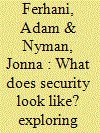|
|
|
Sort Order |
|
|
|
Items / Page
|
|
|
|
|
|
|
| Srl | Item |
| 1 |
ID:
134722


|
|
|
|
|
| Summary/Abstract |
Energy is becoming more and more important to state survival and economic development, and is increasingly considered an issue of ‘national security’. In 2005, the bid by China National Offshore Oil Corporation (CNOOC) for US energy company Unocal was securitised by US elite actors, who called for presidential action on the grounds of ‘national security’. This article argues that securitisation of energy is problematic, as it impedes cooperation and encourages strategic and/or economic competition between states over energy supplies by tying energy to a national security ‘us vs. them’ scenario. Moreover, it limits the energy security debate. The article will use a securitisation approach to analyse the discourse of the Unocal affair, together with a smaller complementary case study of US–China cooperation on shale gas to show the possibility of dealing with energy in desecuritised terms. It argues that the current literature on energy ‘security’ analyses policy in overly simplistic competition/cooperation terms and fails to recognise the policy implications of securitising energy. In contrast, a securitisation approach to energy can explain the (re)presentation of energy as a policy issue and allows an analysis of how using particular discourse makes particular policy possible, while silencing alternative policy options. This has implications for policy-making in this area as energy policy/practice should be desecuritised.
|
|
|
|
|
|
|
|
|
|
|
|
|
|
|
|
| 2 |
ID:
190702


|
|
|
|
|
| Summary/Abstract |
IR’s visual turn has emphasised visual analysis over visual method, centring images of war and crisis. Meanwhile security studies centres great power politics and moments of rupture. Together, they reinforce a dominant image of security as spectacular. This article unites two ethnographic projects focused on everyday security: one examining everyday security landscapes in China, and one examining health security at the UK border. Both found a gap between the dominant image of security and what we saw, and explored this gap through photography. Building on the everyday and visual turns, the article introduces interpretive photography as method to make two contributions. The first is methodological: it introduces interpretive photography as a distinct critical qualitative method that operates on five modes: enabling the seeing-capturing-making-sharing of visual artefacts, it also disrupts dominant visions and contributes to the construction of international relations. The second contribution is empirical: a deeper, richer account of what security looks like. While the discipline associates security with emergency politics or a state of exception, Nyman’s photographs show the exception-made-everyday, while Ferhani’s photos reject the exception by showing banal routines. In this way, photography engages the visuality of security, and can change how we see security.
|
|
|
|
|
|
|
|
|
|
|
|
|
|
|
|
| 3 |
ID:
148786


|
|
|
|
|
| Summary/Abstract |
Review of International Studies has seen a debate over the value of security. At its heart this is a debate about ethics: concerning the extent to which security is a ‘good’ and whether or not security politics produces the kind of world we want. More recent contributions focus on the extent to which security is ‘positive’ or ‘negative’. However, this article argues that the existing debate is limited and confusing: key authors use the terms ‘positive’ and ‘negative’ in different, and, at times, contradictory ways. The article clarifies the roots of the existing debate, and then draws out two different uses of the terms positive and negative: an analytic frame and a normative frame. In response, it proposes a pragmatist frame that synthesises the existing uses, drawing on pragmatism and practice-centred approaches to analyse the value of security in context. The contribution of the article is thus twofold: it both clarifies the existing debate and suggests a solution. This is key because the debate over the value of security is crucial to thinking about how we want to live.
|
|
|
|
|
|
|
|
|
|
|
|
|
|
|
|
|
|
|
|
|